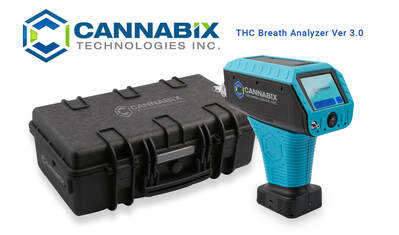News Releases
Cannabix Technologies Develops Version 3.0 of THC Breath Analyzer Device
February 25, 2021
Vancouver, British Columbia, February 25, 2021-- Cannabix Technologies Inc. (CSE: BLO) (OTC PINK: BLOZF) (FRANKFURT: 8CT) (the “Company or Cannabix”) developer of the Cannabix Marijuana Breathalyzer devices for law enforcement and the workplace, is pleased to report that it has developed the latest version of the THC Breath Analyzer (“THCBA) prototype and portable system for field use. The new system incorporates a new protective case which houses a sterilization module, smart sample preparation stage and integrated battery charging system. In addition, engineers have enhanced the handheld device for field use in several ways including revisions to the screen placement, improved breath flow analysis and upgraded microcontroller. New images of the THCBA version 3.0 are included in this press release and available on the Company’s website.

THCBA testing is ongoing and is focused on training the device’s machine learning database, determining sensitivity ranges and improving user and administrator experience. The THCBA has been built to provide easy to understand screen prompts for the positive and negative detection of ∆9-tetrahydrocannabinol (“THC”) - the psychoactive component of marijuana that causes impairment in breath, and can be administered with limited training. The system provides results in under five minutes.
The THCBA has been targeted for employers and other markets who are seeking a way to quickly, easily and non-invasively test for recent use of THC. Employers everywhere are struggling with the limitations of current drug testing technology in identifying recent use of marijuana that may be causing impairment during work hours and differentiating this from recreational and medical use during nonwork hours/days. The Cannabix device allows for more relevant THC detection from breath allowing employers to create an onsite regiment whereby they can perform pre-access testing for recent use of marijuana before and during work hours, instead of testing for drug use when employees are not at work.
Current forms of testing for marijuana use can identify THC ranging from minutes to days after actual use, making it impossible to show the difference between the two. Studies¹ have shown that breath is a better indicator of impairment than saliva, blood, or urine because THC is present in breath for a relatively short period of time (1-3 hours); whereas, it is excreted at detectable levels in other body fluids for many hours, days, or even weeks after smoking. This short time period of detection in breath aligns with the peak impairment window.
The Company wants to acknowledge the rapidly changing environment for cannabis use in the U.S. The November election in the U.S. saw the addition of Arizona, Montana, New Jersey, and South Dakota approving recreational marijuana legalization. In February, news agencies have reported that that top Democrats including senators Cory Booker (NJ), Ron Wyden (OR), and Chuck Schumer (NY) are seeking to advance comprehensive cannabis reform legislation in the United States Congress. These kinds of significant developments increase the focus on public safety as cannabis use is legalized in new jurisdictions and emphasizes the importance of the kinds of tools that Cannabix Technologies is developing to support public safety.
(1) Olla P, Ishraque MT, Bartol S. 2020. Evaluation of Breath and Plasma Tetrahydrocannabinol Concentration Trends Postcannabis Exposure in Medical Cannabis Patients. Cannabis and Cannabinoid Res.; 99-104.
Himes S. et al. 2013. Cannabinoids in Exhaled Breath following Controlled Administration of Smoked Cannabis. Clinical Chemistry; 1780–1789.
Beck O, Sandqvist S, Dubbelboer I, Franck J. 2011. Detection of delta9-tetrahydrocannabinol in exhaled breath collected from cannabis users. J Anal Toxicol; 35:541– 4.
Disclaimer:
The information in these press releases is historical in nature, has not been updated, and is current only to the date indicated in the particular press release. This information may no longer be accurate and therefore you should not rely on the information contained in these press releases. To the extent permitted by law, Cannabix Technologies Inc. and its employees, agents and consultants exclude all liability for any loss or damage arising from the use of, or reliance on, any such information, whether or not caused by any negligent act or omission.

